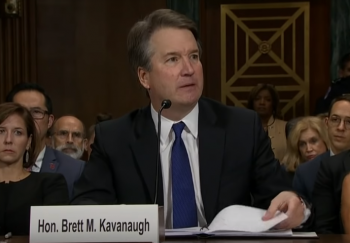Users Who Spiked

THE COLLEGE TUITION SCANDAL: A CRITICAL ANALYSIS
Private Notes
Private Notes
Notes
Thus far, 2019 has been another in a long string of unbelievable years. In fitting with that theme, another absurd media scandal continues to unravel as we head into spring. The appropriately-titled “College Tuition Scandal” comes as a surprise to only some; academic bribery is one of those shameful societal phenomena that we all choose to implicitly ignore. It’s pretty common knowledge that people with tons of money operate under a different set of rules. It’s an old story.
And since it’s a story we all know so well, I’m going to skip the mundane details. The word “bribery” sums it all up fairly well. Instead I’d like to break down the unique little tidbits that set this case apart. To consider, if you will, how this scandal holds up from a storytelling perspective.
1. Seriously, how much is college admission worth to these people?
Getting into a prestigious college can set you up for life. I get that. But in some of these cases, individual bribes were in the million-dollar range. As in, a medium range bribe ended up being like five hundred thousand dollars. Is the education you’re getting really worth that—and tuition? You can get a bachelor’s degree from a state university for less than the value of that admissions bribe alone. What exactly is so special about these specific institutions?
Hell, in today’s economy that $500k could allow you to live comfortably for an entire human life. Hire an accountant, start a business (no loan required), diversify your investments a little, live in a modest suburban home. You’ll never want for money again. People rob banks for less. I ask again, what’s so valuable about these specific institutions that people will illegally pay tons of money just for guaranteed admission?
2. This is maybe the laziest scandal I can remember.
Man, reading through the details of this thing would be comical if it wasn’t so unethical. In many cases students’ ACT and SAT scores were faked. Want to know the big secret of how they did it? They bribed the proctors, and then paid a “really smart” guy to take the test for them. That’s it.
Well, that’s almost it. In a few cases they bribed a mental health professional to have their child labeled “special needs” to garner extra test-time. Then they’d use the same disabled designation to meet admission quotas. Basically, faking a disability for points. Evidently some of the students didn’t even know about that part.
Want to hear my favorite trick? Sometime’s they’d bribe a coach to get an athletic recommendation. As we all know, promising athletes are given priority in terms of admission (which, is that even a good practice?). But some of these students didn’t even play the sport they were being falsely recommended for. So—get this—they photoshopped their kid’s face onto a picture of an actual talented athlete. And that worked. For years.
3. And what’s the deal with sports, anyway?
Again, I get it. Athletics are important. And promising athletes should have an environment in which they can get training without sacrificing their education. I think maybe the system could use a little work but I don’t disagree with it in principle.
But weirdly it seems like some of the biggest bribes went to coaches. At first glance that might seem like a good strategy. Even with less-than-average test scores an athletic recommendation can get you into college (with scholarships). It seems to me, though, that somewhere along the way that charade would fall apart. Like when a student with a crew scholarship can’t row for instance. Did a one-time bribe really cover four years of looking the other way?
4. “I’m sure this was just an isolated incident.”
Exactly how much of this kind of thing goes down? Take that thing they did, getting their kid designated as learning disabled. That trick isn’t limited to a specific conspiracy. Anyone without a moral compass can pull that off, regardless of where they are or what university they’re scamming.
If this kind of thing is truly a widespread phenomenon then that’s totally and obviously unfair—to everybody. Every time a student is wrongfully admitted, that’s bumping a legitimate student out. And so, it begs the question: can you actually get into a prestigious university by playing fair? Maybe that sounds like hyperbole, and maybe it is. But take into account how many students are given favoritism because of a legitimate donation. Or because their family is legacy. If you’re just a regular person that doesn’t have a small fortune, do you have any chance at all of getting into these schools?
Given the grievous implications and breathtaking sums of money, I’m honestly most surprised by the fact that this scandal even went public. Surely such a thing would (justifiably) lead to increased scrutiny within the academic community in general. And obviously the people and institutions involved have enough money to merit a certain degree of untouchability. Blowing this case open is bad for everybody. Except the concept of justice, of course, but that’s usually a secondary concern at best. Just what the hell was this whole thing about?
Only time will tell. If it even does. But for right now all I can say is it’s a pretty well-constructed narrative. It’s thought provoking, full of intrigue, and even features some comic misadventures. Despite some important questions left unanswered, I’d probably see the movie.
Comments
Please login to post comments on this story
-
Interesting read James! Your stuff is always very insightful and with a unique perspective. Thanks for sharing!
-
Getting into a prestigious college can set you up for life. I get that. But in some of these cases, individual bribes were in the million-dollar range. As in, a medium range bribe ended up being like five hundred thousand dollars. Is the education you’re getting really worth that—and tuition? You can get a bachelor’s degree from a state university for less than the value of that admissions bribe alone. What exactly is so special about these specific institutions?Hell, in today’s economy that $500k could allow you to live comfortably for an entire human life. Hire an accountant, start a business (no loan required), diversify your investments a little, live in a modest suburban home. You’ll never want for money again.
Exactly! It's pure social status and bragging rights to me. It's not even just the rich/wealthy parents, it's regular parents too, forcing their kids to go to school just for bragging rights and to have this head held high, nose to the sky social status. Those people could easily use that to invest into a business or businesses and make multi-millions a year. It's really not even necessary. People are so concerned about how others look at them and wanting to be above everyone else, they'll go through with spending x amounts of money more than the cost of the actual education at hand to say their kids went to college, a prestigious college, and did well. It's like a social club. Like those country clubs, it's all about status as most members can't even play golf, or some kind of millionaires club. -
They bribed the proctors, and then paid a “really smart” guy to take the test for them. That’s it.Well, that’s almost it. In a few cases they bribed a mental health professional to have their child labeled “special needs” to garner extra test-time. Then they’d use the same disabled designation to meet admission quotas. Basically, faking a disability for points.
Wow, I didn't know this. I know they bribed them for higher test scores, but I didn't know they paid a smart person to take the exam for them. I also didn't know they got a mental health professional to place them as "special needs" For that extra time, I thought they just paid the SAT or ACT exam administrator, and they just gave them a better score and more time to take the exam. It really is deeper than what I thought. I can't say I'm surprised with anything at this point, but I'm glad it's happening because I feel like there's so much corruption in the higher education specter, and this opens the doors to truly investigate it as a whole. Thanks for providing this info. -
This is an interesting piece. I feel so annoyed when I read about this whole scandal. For every spot that these parents were buying for their students, another hardworking and more worthy student got waitlisted or rejected. The thing is though, even without scandals like this, the college admissions process is fundamentally unequal. Some families can pay for admissions counselors and multiple test prep courses, while others can hardly pay for a single SAT test. I guess it's a factor of our society, in general, being unequal, but I really hope that major changes can come about for colleges, including lowering the cost of tuition (which is obscene at so many schools).





































